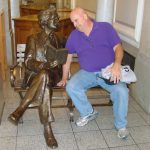For years, people told me I had it all. Turns out, “all” isn’t much if it doesn’t include yourself. This is the story of how I unlearned success — not by choice, but by running out of choices. Somewhere between failure, desperation, and maybe too many bad metaphors, I stumbled my way into finding myself.
I. The Myth of Strength
Like most men, I was taught to be strong. To win. To be a good provider. To keep my chin up and my feelings down. We say men are taught not to cry, but that’s not quite right — we’re taught not to feel at all. Doing is more important than feeling.
Camaraderie and cocktails. Brotherhood and beer. And for those who don’t drink — cannabis and connection. It’s how we learned to hide from ourselves, and call it strength.
The cultural messages come loud and clear: competence beats connection, money means safety, power over is better than power with, and vulnerability is a weakness. Playing cards, playing sports, it didn’t matter: never let ’em see you bleed. I remember a friend on the football team quoting Red Sanders, the UCLA football coach: “Winning isn’t everything; it’s the only thing.” If you can’t outmuscle a problem, outwork it. And if you can’t outwork it, fake it.
I believed that if I worked hard enough, earned enough, and achieved enough, I’d be happy. I wasn’t — but I didn’t know it, not only because I was too busy chasing the next achievement, but because feelings weren’t really part of the equation. And so, success becomes a moving target — check one box, add two more. Bigger, harder, shinier. It was a race with no finish line.
II. Success, Yes. Fulfillment, Not So Much
I had everything I believed I needed to make me happy. A good income. A home in Manhattan Beach. Two wonderful kids. A wife with her own thriving career. And still, something was off. I didn’t know what it was, but the feeling was familiar — like sharp gears grinding away at the insides of my stomach and chest.
I kept doing everything right, but nothing felt right. Looking in at me, outsiders saw success. Being me, I felt like a loser. So I did the only thing that made sense: I put my head down and I tried harder. Sure, a nice home in Manhattan Beach — but that’s just a stepping stone to the one high up in Palos Verdes! If I couldn’t deliver the home in Palos Verdes, it was my personal failure — I was too lazy, too stupid to achieve. No excuses. I wasn’t drinking to feel good — I was drinking because real men drink.
III. The Invisible Threads of Family
Here’s the thing: when we’re born, we’re not born into a vacuum. We’re born into a family. Crazy, calm, loving, fighting, peaceful, sober, addicted, lawful, criminal, rich, poor — it doesn’t matter. Families respond to their conditions by creating their own rituals of communication, of dominance and submission, of affection and avoidance. Those patterns get stitched into us before we can name them, invisibly and unquestioned. They shape how we love, how we work, how we cope. They become what I call the invisible threads of family.
Those invisible threads kept sewn into exactly where I was: performing success, managing pain, keeping it all together. Therapy was where I started to see them for what they were — not destiny, just conditioning. You can’t fight an invisible enemy. But once you see the threads, you can start to untangle them.
IV. The Unraveling
The threads told me everything was fine — I was just tired, overworked. But I was angry all the time. Drinking more. Arguing more. The cognitive dissonance was brutal: on paper everything was perfect, but inside the gears grinding were tearing my stomach apart.
Without telling a soul, I walked into a therapist’s office. I didn’t go to therapy to change my life. I went because I was out of other bad ideas. It was my last resort.
It was the first time I ever heard myself say out loud that things might not be OK. My first questions to my therapist were versions of, “Am I even normal?” It took several sessions before I believed in the possibility that I might be.
Therapy wasn’t comfortable. It was awkward, messy, and slow. But it was the first place I stopped performing long enough to notice what was actually happening inside. It’s where the invisible threads started to become visible, accessible. I learned I wasn’t drinking to feel good — I was drinking because it’s how I managed feelings I didn’t know I was having.
V. The Breaking Point
A few years of therapy later, I’d quit the job. I’d quit the marriage. I kept the kids, but created a different kind of home. My kids were going to inherit different threads than I did — not the ones about silence and striving, but ones about rest, laughter, and choosing their own pace.
Once you start untangling the threads that have held you in place, you find freedom… but you also find that you don’t have any idea where to go. And so, like a kid in a candy store, I didn’t always make good choices. Decorating differently for Christmas worked out great. Second wife, not so much. Apparently, freedom comes with a learning curve and a divorce decree. Like living in the snack-food aisle — tasty, quick, and regrettable.
VI. The Career Pivot
By my fifties, I’d been running my own business for over twenty years. It had been good, then okay, then… not. The market shifted, the money thinned, and I realized I was out of gas. The invisible threads were still whispering, “Push through, don’t quit,” but there was nothing left to push. I exhaustively ran down every idea before finally folding the business. It was one more failure on what felt like a stack of failures.
One night, on a whim, I visited a university that offered a master’s program in therapy. Me, the ex–software exec, the salesman, the guy who lived on Ayn Rand and caffeine — walking into a building full of people who wanted to talk about feelings. I’d spent 20+ years at Chamber of Commerce meetings, and now I’m surrounded by therapists? Culture shock doesn’t begin to cover it.
Then I watched a grainy video of Carl Rogers doing therapy — and something clicked. The thing I’d been searching for all along wasn’t success. It was connection. Presence. Humanity. It was like a light turned on inside me. After all the noise, all the striving, there it was — me, myself, found.
VII. Coming Home
It’s funny — I used to think strength was about endurance, “powering through.” Now I think it’s about honesty. Integrity. Real strength isn’t armor. It’s letting the armor fall off and noticing that you can take the hits without carrying all the weight.
In my office now, I see men who remind me of younger versions of myself. They’ve got good jobs, good families, and a quiet misery they can’t quite name. They’ve been taught to solve emotions by ignoring them. And when they can’t ignore them anymore, they “make mistakes” that make them feel like failures. But they’re not broken — they’re just carrying too much armor, held in place with too many invisible threads.
VIII. Home
I didn’t get the life – or wife – I wanted by chasing my dream. I got it by learning to listen to myself — and others. Like relationships themselves, it just turned out to be a lot harder than I ever thought it would be. Now, I come home — not to Manhattan Beach, not to Palos Verdes, but home. My real home. My real wife. The one that fits me. The one built for who I’ve become. We share our home with the few we invite in.
There’s quiet here. Books, laughter, light, fun, adventure. And every once in a while, I think about how far I had to travel to get back to where I always belonged.










